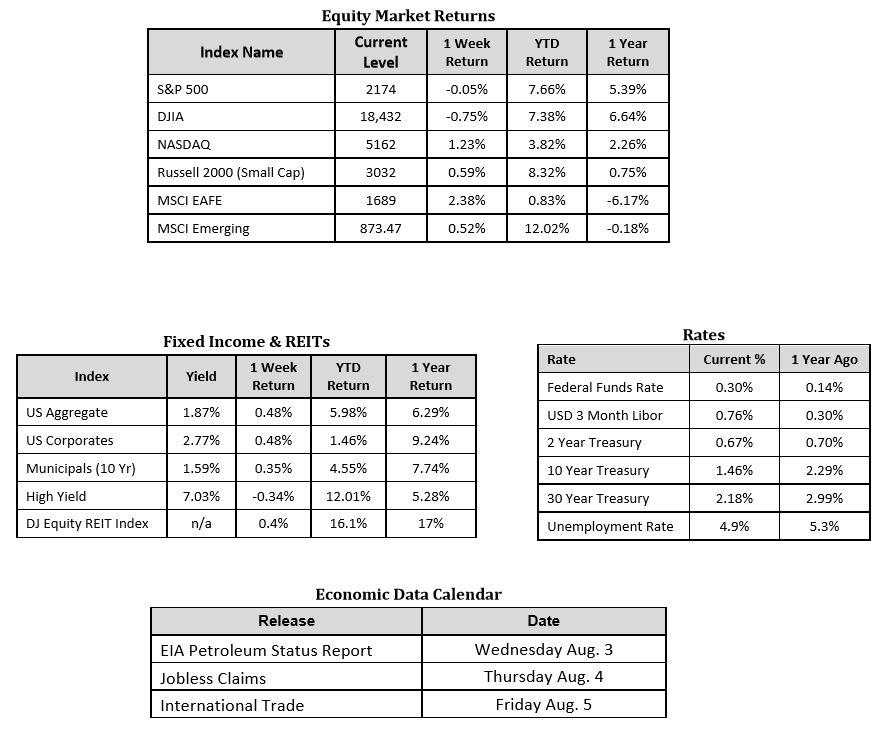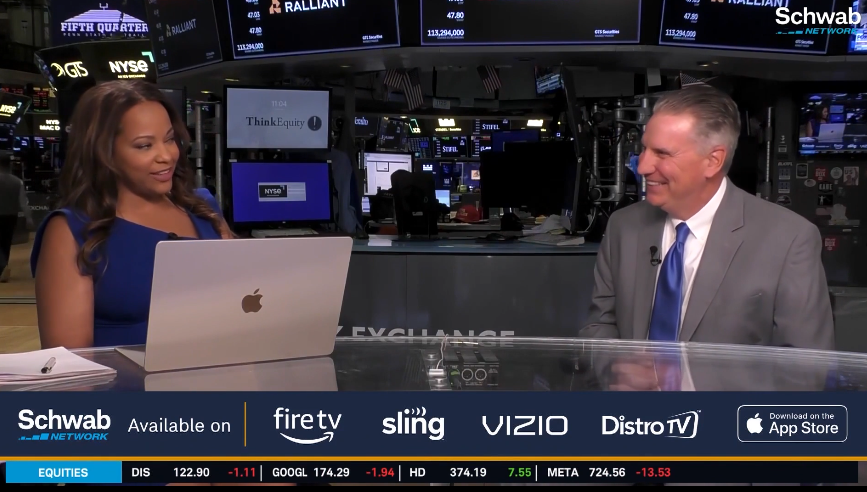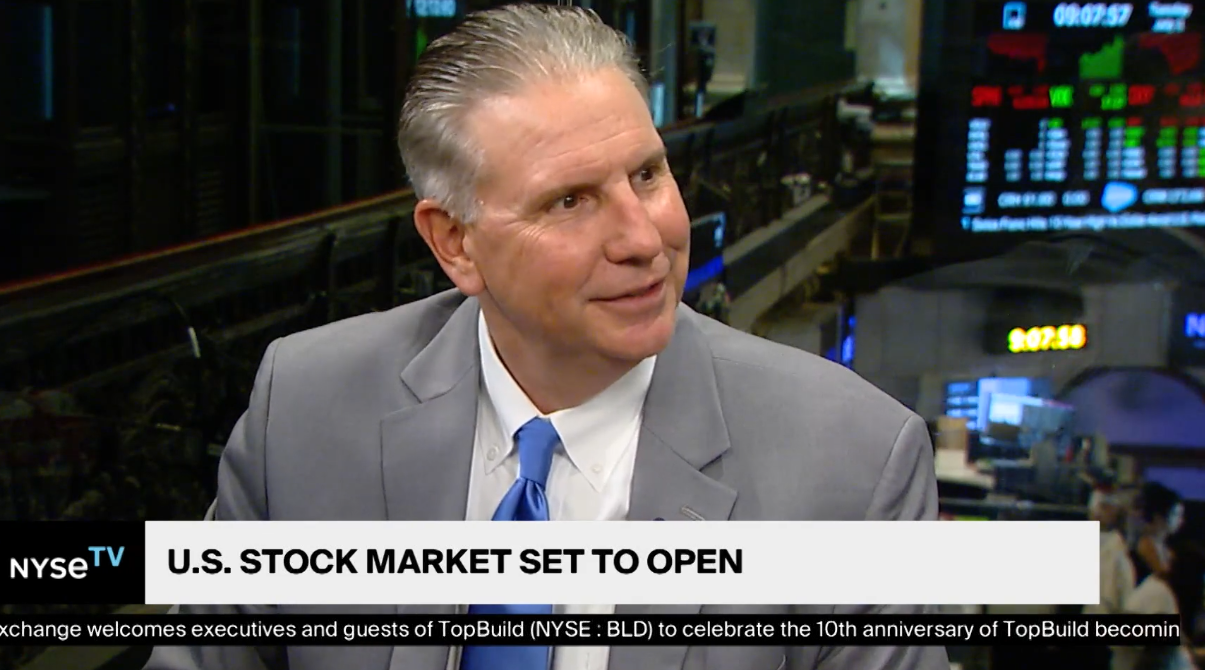
Federal Reserve Maintains Rates, U.S. GDP Disappoints and International Stocks Post Gains
Market Overview

Sources: Equity Market, Fixed Income and REIT returns from JP Morgan as of 07/29/16. Rates and Economic Calendar Data from Bloomberg as of 08/01/16.
Happening Now
U.S. stocks sold off slightly last week with the S&P 500 index losing 0.05% and the Dow Jones Industrial Average falling 0.75%. Conversely, International Developed markets outpaced both U.S. stocks and international emerging markets with gains in the MSCI EAFE Index of 2.4% versus the 0.5% increase in the MSCI Emerging Markets Index. International Developed markets are now in positive territory for 2016, up 0.8% for the year but still lag U.S. stocks which have increased by 7.7% and Emerging Markets which have gained 12% since December 31, 2015.
Trading was subdued much of last week with U.S. stocks alternating between small daily losses and gains in advance of, and following, Wednesday’s announcement from the Federal Reserve to leave interest rates unchanged again. Citing continued improvement in the economy, the Federal Open Market Committee’s announcement suggested that if labor market conditions continue to improve and the outlook for inflation remains unchanged, a rate hike (or potentially hikes) this year would be appropriate.
Last week also saw a steady flow of positive economic data releases including purchases of new single family homes which rose 3.5% in June – beating estimates – as well as Consumer Confidence and Sentiment readings registering lower but still posting results of 97.3 and 90.0 respectively. Despite signs of an improving consumer, U.S. second quarter GDP came in at only 1.2% while expectations were for a 2.6% gain. This may stoke fears of a global economic slowdown, however, investors should remember that GDP is a complicated measure and Friday’s release was the “advanced estimate.” Additional revised estimates often paint a much different picture, so keep an eye out for a “second estimate” on August 26th and the final “third estimate” on September 29th.
While volatility has been subdued in recent weeks, we caution investors not to become complacent. Now may be an appropriate time to make any necessary changes to help their portfolios withstand future wide, unexpected swings in stocks prices. Consider that the month of August, in recent history, has experienced its fair share of market sell-offs. For example, during August of 2015, the Chinese stock market plummeted and caused a ripple effect that was felt in the U.S. where the S&P 500 index dropped 6.1% for the month. August of 2010 and 2011 also saw historically large drawdowns as investor concerns regarding a potential double dip recession in Europe and uncertainty of contagion stemming from Portugal, Italy, Ireland, Greece, and Spain (offensively called the “PIIGS” countries) led to sell-offs of 4.5% and 5.5% in U.S. stocks during the month of August in these respective years.
Important Information and Disclaimers
Disclosures: Hennion & Walsh is the sponsor of SmartTrust® Unit Investment Trusts (UITs). For more information on SmartTrust® UITs, please visit www.smarttrustuit.com. The overview above is for informational purposes and is not an offer to sell or a solicitation of an offer to buy any SmartTrust® UITs. Investors should consider the Trust’s investment objective, risks, charges and expenses carefully before investing. The prospectus contains this and other information relevant to an investment in the Trust and investors should read the prospectus carefully before they invest.
Investing in foreign securities presents certain risks not associated with domestic investments, such as currency fluctuation, political and economic instability, and different accounting standards. This may result in greater share price volatility. These risks are heightened in emerging markets.
There are special risks associated with an investment in real estate, including credit risk, interest rate fluctuations and the impact of varied economic conditions. Distributions from REIT investments are taxed at the owner’s tax bracket.
The prices of small company and mid cap stocks are generally more volatile than large company stocks. They often involve higher risks because smaller companies may lack the management expertise, financial resources, product diversification and competitive strengths to endure adverse economic conditions.
Investing in commodities is not suitable for all investors. Exposure to the commodities markets may subject an investment to greater share price volatility than an investment in traditional equity or debt securities. Investments in commodities may be affected by changes in overall market movements, commodity index volatility, changes in interest rates or factors affecting a particular industry or commodity.
Products that invest in commodities may employ more complex strategies which may expose investors to additional risks.
Investing in fixed income securities involves certain risks such as market risk if sold prior to maturity and credit risk especially if investing in high yield bonds, which have lower ratings and are subject to greater volatility. All fixed income investments may be worth less than original cost upon redemption or maturity. Bond Prices fluctuate inversely to changes in interest rates. Therefore, a general rise in interest rates can result in the decline of the value of your investment.
Definitions
MSCI- EAFE: The Morgan Stanley Capital International Europe, Australasia and Far East Index, a free float-adjusted market capitalization index that is designed to measure developed-market equity performance, excluding the United States and Canada.
MSCI-Emerging Markets: The Morgan Stanley Capital International Emerging Market Index, is a free float-adjusted market capitalization index that is designed to measure the performance of global emerging markets of about 25 emerging economies.
Russell 3000: The Russell 3000 measures the performance of the 3000 largest US companies based on total market capitalization and represents about 98% of the investible US Equity market.
ML BOFA US Corp Mstr [Merill Lynch US Corporate Master]: The Merrill Lynch Corporate Master Market Index is a statistical composite tracking the performance of the entire US corporate bond market over time.
ML Muni Master [Merill Lynch US Corporate Master]: The Merrill Lynch Municipal Bond Master Index is a broad measure of the municipal fixed income market.
Investors cannot directly purchase any index.
LIBOR, London Interbank Offered Rate, is the rate of interest at which banks offer to lend money to one another in the wholesale money markets in London.
The Dow Jones Industrial Average is an unweighted index of 30 “blue-chip” industrial U.S. stocks.
The S&P Midcap 400 Index is a capitalization-weighted index measuring the performance of the mid-range sector of the U.S. stock market, and represents approximately 7% of the total market value of U.S. equities. Companies in the Index fall between S&P 500 Index and the S&P SmallCap 600 Index in size: between $1-4 billion.
DJ Equity REIT Index represents all publicly traded real estate investment trusts in the Dow Jones U.S. stock universe classified as Equity REITs according to the S&P Dow Jones Indices REIT Industry Classification Hierarchy. These companies are REITSs that primarily own and operate income-producing real estate.



